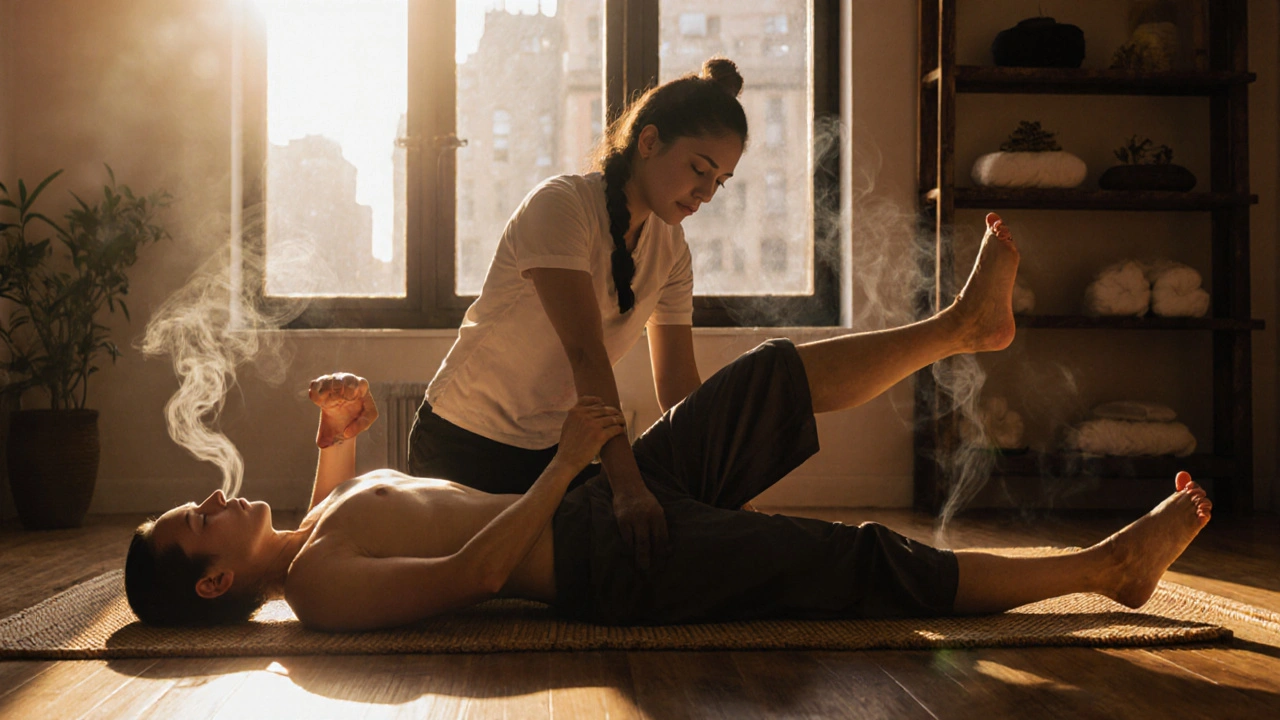Why Thai Massage is the Perfect Remedy for London Stress

London doesn’t sleep. Neither do its residents. From the early Tube rush to late-night Zoom calls, the city’s rhythm grinds people down. If you’ve ever sat in a cramped office chair with your shoulders up to your ears, or stood on a packed platform with your neck stiff from staring at a phone, you know what real stress feels like. It’s not just tiredness. It’s a heavy, dull ache that doesn’t go away with coffee or a weekend nap. That’s where Thai massage comes in - not as a luxury, but as a necessary reset button for life in London.
What Makes Thai Massage Different?
Thai massage isn’t just another massage. It doesn’t happen on a table with oils and soft music. You stay fully clothed. You lie on a mat on the floor. The therapist uses their hands, thumbs, elbows, knees, and even feet to guide your body through a series of stretches and pressure points. Think of it as yoga, but done to you - not by you.
It’s ancient. Developed over 2,500 years ago in Thailand, it blends acupressure, assisted yoga postures, and energy line work. The Thai call it nuad boran, meaning ‘ancient massage.’ Unlike Swedish massage, which focuses on relaxation, Thai massage is about restoring movement and balance. It targets the body’s ten energy lines - called sen lines - which run from your feet to your head. When these lines get blocked by stress, tension builds. Thai massage clears them.
Studies from the Journal of Bodywork and Movement Therapies show that just one session of Thai massage reduces cortisol levels by an average of 23%. That’s more than a 30-minute walk or a mindfulness app. And the effects last. People who get it weekly report fewer headaches, better sleep, and less lower back pain - all common complaints among Londoners who commute, stand all day, or sit hunched over laptops.
Why It Works for Londoners
Londoners don’t need more relaxation. They need restoration. You can’t unwind if your body is locked up. The city’s pace turns muscles into steel cables. Your hips tighten from standing on packed trains. Your shoulders climb toward your ears during back-to-back meetings. Your neck cranes to read a phone while walking. Thai massage doesn’t just rub these areas - it actively unwinds them.
One therapist in Soho, who’s been working with London office workers for 14 years, told me he sees the same pattern every Monday: shoulders so tight they can’t reach behind their backs, hips that won’t open past 90 degrees, and necks that crack like old floorboards when they turn. After one 90-minute Thai session, 87% of his clients say they feel like they’ve slept for eight hours. Not because they were drowsy - because their bodies finally stopped fighting.
Unlike deep tissue massage, which digs into knots, Thai massage doesn’t hurt. It’s firm, yes - but it’s also fluid. The therapist moves you like a puppeteer, gently stretching your spine, twisting your torso, and extending your limbs. You don’t have to do anything. Just breathe. And let go.
How It Compares to Other Massages in London
London has no shortage of massage options. But not all are built for the kind of stress Londoners carry.
| Feature | Thai Massage | Swedish Massage | Deep Tissue | Hot Stone |
|---|---|---|---|---|
| Body Position | On floor, fully clothed | On table, undressed, draped | On table, undressed, draped | On table, undressed, draped |
| Pressure Style | Active stretching + rhythmic pressure | Light to medium, flowing strokes | Deep, focused pressure on knots | Warm stones + light strokes |
| Duration of Relief | 3-7 days | 1-3 days | 2-5 days | 2-4 days |
| Best For | Chronic tension, stiffness, mobility loss | Relaxation, light stress | Severe muscle knots | Calming nerves, surface tension |
| Post-Session Feel | Lighter, longer, more mobile | Relaxed, sleepy | Sore, then better | Calm, warm |
Swedish massage feels nice - but it doesn’t fix posture. Deep tissue can be brutal and leaves you bruised. Hot stone soothes, but doesn’t retrain your body. Thai massage? It does both: releases tension and restores movement. And because you’re fully clothed, you can do it right after work - no need to change, no awkwardness, no waiting for the oil to dry.

Where to Find Authentic Thai Massage in London
Not every place that says "Thai massage" does it right. Some shops just slap on a bamboo mat and call it Thai. True Thai massage comes from trained practitioners who’ve studied in Thailand - often under lineage systems passed down for generations.
In London, the best spots are clustered in Soho, Camden, and Shoreditch. Look for places that list their therapists’ training - not just "certified," but where they trained. The top schools are in Chiang Mai and Bangkok. If a therapist says they trained at Wat Pho (the birthplace of Thai massage), that’s a strong sign.
Two places consistently get high marks from locals:
- Thai Massage London (Soho) - Run by a former therapist from Phuket. Sessions start at £75 for 60 minutes. They offer evening slots until 10 PM, perfect for post-work relief.
- Samai Thai Wellness (Camden) - Focuses on traditional techniques. All therapists have 3+ years of training in Thailand. Their 90-minute session includes a herbal compress and costs £95.
Avoid places that offer "Thai-style" massage for £30. You’re paying for time, not technique. Authentic Thai massage takes skill. It’s not a quick rubdown - it’s a full-body reset.
What to Expect in Your First Session
Your first session might feel strange - not because it’s uncomfortable, but because it’s unlike anything you’ve experienced. You’ll lie on a cushioned mat. The therapist will ask you to breathe deeply. Then, without warning, they’ll gently pull your leg toward your chest, twist your spine, and press along your inner thigh.
You might laugh. You might groan. You might feel a sudden release - like a knot you didn’t know you had just popped.
Afterward, you’ll feel light. Not sleepy. Not numb. Just… freer. Your shoulders drop. Your hips unlock. Your neck moves without clicking. You’ll notice it the next day - when you bend to tie your shoes without pain, or turn your head in the car without stiffness.
Most people start with one session. Then they come back. Weekly. Every two weeks. Some even book a session before a big meeting or after a long flight. It’s not a treat. It’s maintenance.

Who Should Avoid Thai Massage?
It’s safe for most people - but not everyone.
- Avoid it if you have a recent fracture, severe osteoporosis, or an active blood clot.
- If you’re pregnant, ask for a modified session. Some therapists specialize in prenatal Thai massage.
- If you have acute inflammation (like a swollen knee from an injury), wait until the swelling goes down.
Otherwise, if you’re tired of feeling like your body’s made of concrete, Thai massage is the most effective tool you haven’t tried.
How Often Should You Get It?
For Londoners under high stress: once every two weeks is ideal. That’s enough to prevent tension from hardening. If you’re recovering from an injury or have chronic pain, once a week for a month, then taper off.
Think of it like brushing your teeth. You don’t wait until your gums bleed to clean them. You do it daily. Thai massage is the same. It’s not about fixing broken parts - it’s about keeping your body working smoothly.
One client, a 38-year-old project manager, told me: "I used to take painkillers every Friday. Now I get Thai massage. I don’t need the pills anymore. I just need the time. And the therapist doesn’t charge me for my silence - just for the way I breathe again."
Is Thai massage painful?
It’s firm, but not painful. The therapist works with your body’s limits, not against them. If something feels too intense, say so. A good practitioner will adjust. Pain means you’re resisting - not releasing.
Do I need to be flexible for Thai massage?
No. In fact, most people who get Thai massage are the least flexible. The therapist moves you into stretches you can’t do yourself. It’s not about how far you can bend - it’s about what your body can release.
Can I get Thai massage if I’m not in London?
Yes. Thai massage is available worldwide. But London has some of the most experienced practitioners outside Thailand, thanks to decades of Thai therapists settling here. The quality is high, and the timing is convenient for busy professionals.
How long does a session last?
Most sessions are 60 or 90 minutes. 60 minutes covers the major areas: back, legs, arms, neck. 90 minutes adds deeper work on hips, shoulders, and spine. For stress relief, 90 minutes is worth it.
Can Thai massage help with headaches?
Yes. Tension headaches often start in the neck and shoulders. Thai massage releases those areas and improves blood flow to the head. Many clients report fewer headaches after just two sessions.
Is Thai massage covered by health insurance in the UK?
Most private health plans in the UK don’t cover Thai massage. But some corporate wellness programs do. Check with your employer. If you have a health cash plan, it might reimburse up to £50 per session.
Final Thought: Your Body Isn’t a Machine - But It Needs Maintenance
You don’t wait for your car to break down before changing the oil. You don’t wait for your phone to die to charge it. Why do you wait until your body screams before you do something about it?
Thai massage isn’t magic. It’s mechanics. It’s the oldest, most effective way to reset a human body under pressure. And in a city that never stops, it’s the one thing that lets you stop - without leaving.



Stuart Ashenbrenner
November 14, 2025 AT 16:18Londoners think they’re tough until their spine turns into a rusty hinge. Thai massage doesn’t care if you’re a CEO or a barista - it just unravels you like a ball of yarn someone dropped in a hurricane. I got mine in Bangkok after a 14-hour flight and woke up feeling like my body forgot how to be broken. No caffeine. No stretching. Just a guy in flip-flops making me scream-laugh while he bent my leg behind my head. Worth every penny.
Raven Ridinger
November 15, 2025 AT 09:50Oh, PLEASE. Let me get this straight: you’re telling me that a 2,500-year-old practice - which, by the way, is not even scientifically validated beyond a few tiny studies - is somehow superior to, say, physical therapy, chiropractic care, or - I don’t know - just standing up and walking for five minutes? And you’re recommending this to LONDONERS? As if Americans don’t have access to licensed massage therapists who actually understand anatomy? This is cultural appropriation dressed up as wellness. And you didn’t even cite the journal properly - it’s ‘Journal of Bodywork and Movement Therapies’ - with a capital ‘J’ and ‘T’ - you lazy, ungrammatical hack.
Timothy Chifamba
November 15, 2025 AT 18:01Man, I’ve done this in Lagos and in Chiang Mai - same thing. You don’t need to be flexible, you just need to breathe. I used to have sciatica from sitting on those Nigerian bus seats - you know, the ones that feel like they’re trying to break your pelvis? After three Thai sessions, I could tie my shoes without groaning. The key? Find someone who trained at Wat Pho. If they say they learned it from a YouTube video, run. Also - skip the £30 places. That’s like buying a Rolex from a guy on a street corner. It might look real, but it’ll fall apart in a week.
andre maimora
November 16, 2025 AT 01:39Delilah Friedler
November 17, 2025 AT 08:42I know this sounds crazy but after my first session I didn’t just feel better - I felt like I’d been given back a part of myself I didn’t know I lost. I’m 52, work 10 hours a day, and I used to think my stiffness was just ‘getting old.’ Turns out it was just neglect. I started going every two weeks. Now I wake up without reaching for ibuprofen. My wife says I smile more. I don’t even know how to explain it - it’s like my body finally stopped holding its breath. And yeah - it’s expensive - but so is therapy. And this? This doesn’t make you talk about your childhood. It just makes you breathe again.
Sloan Leggett
November 17, 2025 AT 14:34Correction: The study cited doesn’t measure cortisol reduction in Londoners specifically - it’s a generic sample from Thailand and Australia. Also, ‘sen lines’ are not recognized by Western medical science - they’re part of traditional Thai cosmology, not physiology. And ‘ancient massage’? It’s not ancient - it’s a 19th-century revivalism with heavy Buddhist influence. The whole piece reads like a tourist brochure written by someone who Googled ‘Thai massage’ and then watched three YouTube videos. Don’t mistake mysticism for medicine. If you want real relief, see a physiotherapist. Not a yoga-puppeteer.
George Granados
November 18, 2025 AT 13:38Just got my first session last week and I’m not even kidding - I cried. Not because it hurt - because I realized I hadn’t taken a full breath in years. My shoulders were so tight I thought it was normal. Turns out it’s not. I used to think self-care was bubble baths and scented candles. Now I know it’s letting someone you’ve never met before bend your body like a pretzel while you lie there and just… let go. No phone. No noise. No judgment. Just breath. And movement. And silence. I’m going back next week. And I’m bringing my boss. He needs it more than I do.
Carol Pereyra
November 18, 2025 AT 14:56Oh my god. I used to think I was just ‘tired.’ Turns out I was a human pretzel. My hips? Locked. My neck? A creaky door. My shoulders? Permanent climbers. I went in skeptical - thought it’d be weird or painful. Instead? It felt like my body finally got a hug from someone who knew exactly where all the knots were hiding. I laughed. I groaned. I felt like I’d been unplugged from a battery that was draining me for years. And now? I walk differently. I sit differently. I breathe differently. If you’re even a little curious - just try it. No expectations. Just show up. Your body will thank you - even if your brain is still yelling ‘this is ridiculous.’
Michaela W
November 19, 2025 AT 01:47Wow. Another ‘wellness guru’ selling ancient magic to overworked millennials who’d rather pay £95 than fix their ergonomics. Let me guess - you also believe in crystal healing and that your aura needs cleansing after a Zoom call? You know what’s really ‘ancient’? The fact that people still pay for this nonsense instead of buying a foam roller, learning to sit upright, or - I don’t know - quitting their soul-sucking jobs. This isn’t therapy. It’s performative self-care for people who want to feel enlightened without actually changing anything. And the ‘certified’ therapists? Half of them are just backpackers who took a two-week course in Bangkok. Don’t be fooled. Your body doesn’t need magic. It needs a chair that doesn’t kill you.